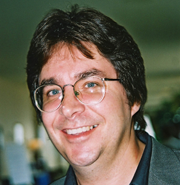Two University of Bristol academics have achieved the rare distinction of being elected Fellows of the world's most eminent and oldest scientific academy in continuous existence.
Professors Ian Manners and Mervyn Miles from the Faculty of Science have been elected Fellows of the Royal Society, a Fellowship of 1,400 outstanding individuals who represent science, engineering and medicine, who form a global scientific network of the highest calibre.
Professor Manners, Professor of Inorganic and Materials Chemistry in the University's School of Chemistry, is an internationally renowned inorganic chemist. His research focuses on the molecular, polymer, supramolecular, and materials chemistry of inorganic elements.
Professor Miles is Head of the Nanophysics and Soft Matter Group in the University's School of Physics. He has pioneered the field of atomic force microscopy (AFM) of biomolecular structures including the development of video AFM and AFM with holographic tweezers for studies at the nanoscale.
Professor Jon Keating, Dean of the Faculty of Science at the University, said: "It is a great accolade to be elected a Fellow of the Royal Society. I am truly delighted for them as they are both worthy recipients who have joined a growing list of 35 FRS's at the University, whose work in the fields of science, engineering, technology and medicine has been honoured in this way.
"These awards not only reflect the scientific excellence for both Schools but also for the Faculty and the University."
The Royal Society is the world's oldest scientific academy and has been at the forefront of enquiry and discovery since its foundation in 1660. Past and present members include Charles Darwin, Albert Einstein, Dorothy Hodgkin, Isaac Newton, Christopher Wren and Stephen Hawking.
Fellows of the Royal Society are elected for life and designate themselves through the use of the letters FRS after their names. Only 44 new members are elected each year.

